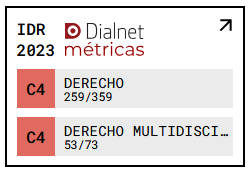La innovación social en la UE
DOI:
https://doi.org/10.18172/redur.4162Resumen
Aunque la innovación social se plantea como una alternativa a los modelos de protección social y productivismo social imperantes desde los años 50s a nuestros días, no está del todo claro qué es la innovación social, cuáles son sus principales potencialidades y cuales sus limitaciones más aparentes. Tampoco está claro si hay una única definición de innovación social, o varias en función de cómo esta se posiciona respecto a elementos clave de la relación Estado-Mercado. En este artículo nos proponemos aportar luz a este debate ofreciendo una definición más integral de innovación social basada en el concepto de eficiencracia.Descargas
Citas
BUREAU OF EUROPEAN POLICY ADVISERS (BEPA), Empowering people, driving change: Social innovation in the European Union, Luxembourg, Publications Office of the European Union, 2010 (http:/ /net4society.eu/_media/Social_innovation_europe.pdf, última consulta en diciembre de 2017)
EUROPEAN COMMISSION, Investing in Social Europe, Luxembourg, Publications Office of the European Union, 2013a.
EUROPEAN COMMISSION, Social Innovation Research in the European Union. Approaches, Findings and Future Directions, Luxembourg, Publications Office of the European Union, 2013b (http:/ /www.net4society.eu/_media/ social_innovation.pdf, última consulta en diciembre de 2017).
EUROPEAN COMMISSION (DG REGIONAL AND URBAN POLICY), Guide to Social Innovation, Luxembourg, Publications Office of the European Union, 2013c, pág. 6 (http://ec.europa.eu/regional_policy/sources/docgener/presenta/social_innovation/social_innovation_2013.pdf, última consulta en diciembre de 2017).
EUROPEAN COMMISSION, Social Innovation: A Decade of Changes, Luxembourg, Publications Office of the European Union, 2014a, pág. 8 (http://ec.europa.eu/DocsRoom/documents/13403/attachments/1/translations, última consulta en diciembre de 2017).
EUROPEAN COMMISSION, Promoting Inclusive Growth - European Social Fund thematic paper, Luxembourg, Publications Office of the European Union, 2014b (http://ec.europa.eu/esf/BlobServlet?docId=445&langId=en, última consulta en diciembre de 2017).
GALLIE, W. B., «IX. Essentially Contested Concepts», Proceedings of the Aristotelian Society, 56 (1), 1956, págs. 167–198. DOI: https://doi.org/10.1093/aristotelian/56.1.167
GRIMM, R., FOX, C., BAINES, S. AND ALBERTSON, K., «Social innovation, an answer to contemporary societal challenges? Locating the concept in theory and practice», Innovation: The European Journal of Social Science Research, 26:4, 2013, págs. 436-455. DOI: https://doi.org/10.1080/13511610.2013.848163
MILLARD, J. ET AL, «Social Innovation for Poverty Reduction and Sustainable Development: Some Governance and Policy Perspectives», paper presented at ICEGOV2016, march 1–3, 2016, Montevideo, Uruguay.
MISURACA, G, AND COLOMBO, C., «ICT-Enabled Social Innovation in Support of Public Sector Reform: the Potential of Integrated Approaches to Social Services Delivery to Promote Social Investment Policies in Europe», paper presented at ICEGOV2016, march 1–3, 2016, Montevideo, Uruguay. DOI: https://doi.org/10.1145/2910019.2910084
OECD, Growing unequal? Income distribution and poverty in OECD countries, 2008 (http://www.oecd.org/social/soc/growingunequalincomedistributionandpovertyinoecdcountries.htm, última consulta en diciembre de 2017).
OECD, Divided we stand: Why inequality keeps reasing, 2011 (http://www.oecd.org/els/soc/dividedwestandwhyinequalitykeepsrising.htm, última consulta en diciembre de 2017).
OGEL, L., «Fundamentos del Triple Balance», 2017 (http:/ /www.praxxis.es/es/noticias/noticias/165, última consulta en diciembre de 2017 y http:/ /www.praxxis.es/es/noticias/noticias/166, última consulta en diciembre de 2017).
OKUN, A.M., Equality and Efficiency: the Big Tradeoff, Washington, The Brooking Institution, 1975.
PUE, K. VANDERGEEST C.AND BREZNITZ, D., «Toward a Theory of Social Innovation», Innovation Policy Lab White Paper, 2016-01, 2016. DOI: https://doi.org/10.2139/ssrn.2701477
RAMOS, J., Crowdfunding and the Role of Managers in Ensuring the Sustainability of CrowdfundingPlatforms, Sevilla, Institute for Prospective Technological Studies - European Commision, 2014(http://publications.jrc.ec.europa.eu/repository/bitstream/JRC85752/jrc85752.pdf, última consulta en diciembre de 2017).
RAMOS, J., «Globalización y Migraciones: La mercantilización de las personas», en Análisis e Investigaciones, 7, 2016, págs. 39-79.
RAMOS, J., «The EU facing Globalisation and the Financial Crisis: The EU-2020 Strategy and the definitive triumph of Commodification in Europe», in RAMOS & DEL CAMPO (eds), Austerity and the implementation of the Europe-2020 Strategy: a Reflexion from the South, Berna, Peter Lang Publisher, 2017. DOI: https://doi.org/10.3726/b11422
ZIEGLER, R., «Social Innovation as a Collaborative Concept», Innovation: The European Journal of Social Science Research, 30:4, 2017, págs. 388-405. DOI: https://doi.org/10.1080/13511610.2017.1348935
Descargas
Publicado
Cómo citar
Número
Sección
Licencia
Derechos de autor 2017 Javier Ramos

Esta obra está bajo una licencia internacional Creative Commons Atribución 4.0.
The works published in REDUR are submitted to the following terms:
- The journal maintains the works published copyright, favours and allows the works reuse under a Creative Commons Attribution-NonComercial-NonDerivs 3.0 Unported license (legal text).
- Permissions beyond the scope of this license may be requested to Copyright Owners.
- Authors accept: the journal’s license of use; copyright policies and self- archiving; open access policy.
- In case of reuse published source must be acknowledged:
- Must include set publisher statement:
First published in Revista del Departamento de Dercho de la Universidad de La Rioja (REDUR) in [volume and number, or year], published by Universidad de La Rioja (Spain). - Set phrase to accompany link to published version:
The original publication is available at: www.unirioja.es/redur







